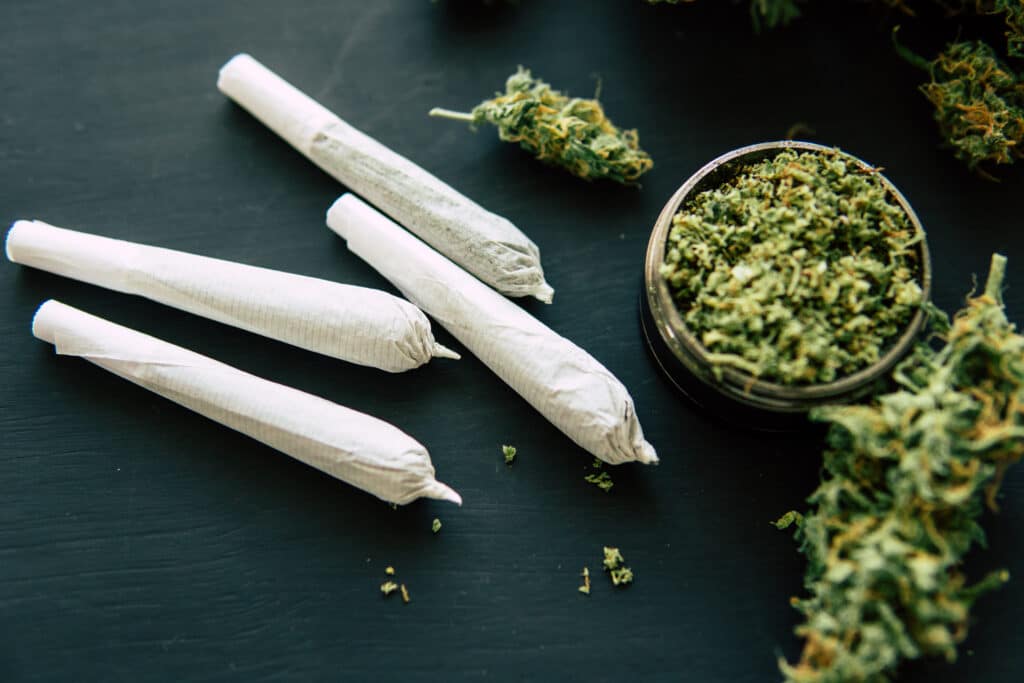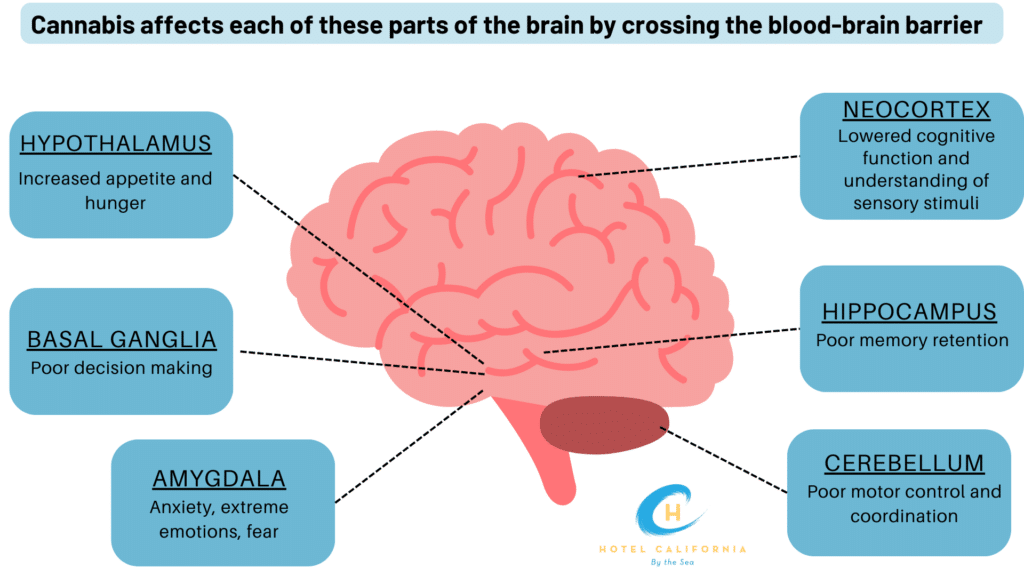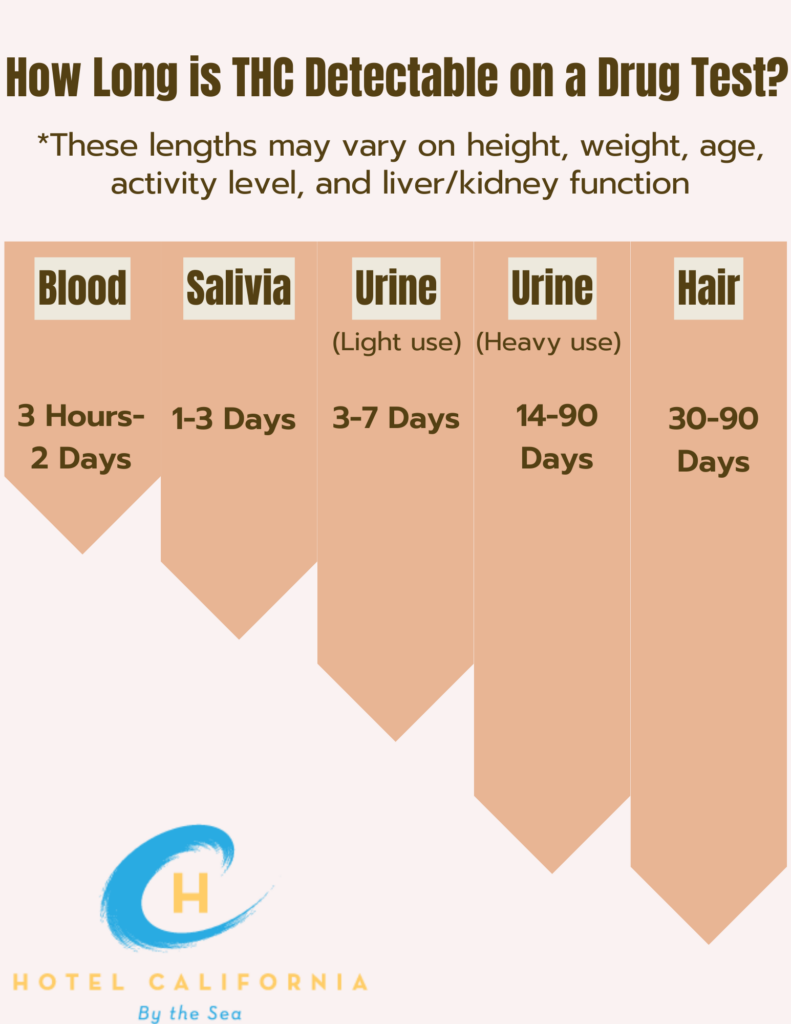Marijuana Addiction and THC Detox
In a recent 2021 study, an estimated 11.8 million young adults aged 18-25, reported using marijuana within the past year. And in 2022, about 30% of 12th graders reported using marijuana within the past year. The usage of marijuana among the younger generation has steadily increased since the 1990s. Today one of the most popular forms of cannabis use is vaping. According to the National Institute on Drug Abuse, around 30% of people who use cannabis, can develop a marijuana use disorder. The risk is even higher when users begin to use the substance during adolescence. Once an addiction has developed, the initial treatment process begins with marijuana detox.
Marijuana detox, THC detox or weed detox is the process in which the body clears itself from toxic substances ingested from cannabis extracts. The severity and difficulty of detox depend on many factors. Factors include how serious the addiction is, other co-occurring mental health conditions that exist as well as other medical conditions, and how long the user has been abusing marijuana. Withdrawal symptoms often occur during the detox process and can produce serious side effects.

Detoxing through a behavioral health program with the assistance of medical and clinical professionals provides a safe and secure environment for users. Marijuana detox can be difficult and dangerous depending on the severity of the addiction. With professional help, detox is meant to help reduce the intensity of any withdrawal symptoms that may develop during this phase of recovery.
There are currently no FDA-approved medications to treat marijuana addiction. However, medical doctors can prescribe certain medications to help treat specific withdrawal symptoms that some patients experience during THC detox. Medications such as metoclopramide or promethazine can help treat feelings of nausea and vomiting. Drugs such as paracetamol or ibuprofen can assist in treating headaches and muscle pain.
Cannabis and Marijuana Addiction
Marijuana is a substance that produces psychedelic feelings of happiness, mild hallucinations, increased appetite and reduced feelings of anxiety. THC, a type of cannabis extract, is the primary psychoactive ingredient in the substance. When regularly used, the brain can develop a tolerance and addiction to its effects. It is considered highly addictive as users crave those feelings of happiness and reduced anxiety. It is one of the most commonly used federally illegal drugs in the U.S. In 2019, an estimated 48.2 million people reported using marijuana or other forms of cannabis extract.
Cannabis extracts are often inhaled through smoking a joint, a bong or through blunts. Smoking marijuana often contains some of the same toxins, irritants and carcinogens as a typical tobacco smoke product. This leads to a greater risk of respiratory conditions like coughing, excessive mucus and the development of bronchitis.

Research has found that marijuana users have about a 10% chance of developing a substance use disorder. According to the Centers for Disease Control and Prevention, about 3 in 10 cannabis users end up developing an addiction to the substance. Cannabis addiction is linked to memory impairment, feelings of paranoia, delays in proper brain development and signs of cognitive decline. Other side effects include impact on attention, coordination, movement and time perception. Studies have shown that long-term abuse of cannabis can produce temporary hallucinations, worsening symptoms of schizophrenia, increased risk of psychosis and worsening symptoms of depression and anxiety.
About 3 in 4 cannabis users who seek out treatment for marijuana use disorder also have another substance use disorder. Research has found that people with marijuana addiction are more likely to use other substances such as alcohol. This contributes to the rise in polysubstance use disorder in many people who abuse marijuana.
Signs of Marijuana Use Disorder
- Using more marijuana than intended
- Trying but failing to quit using marijuana
- Spending large amounts of time using marijuana
- Craving marijuana
- Using the drug despite the problems it creates at home, school or work
- Continuing to use the drug despite social and personal relationship problems
- Needing more marijuana to get high and feel the same effects
- Using the drug in high-risk situations
- Continuing to use the drug despite physical or psychological problems
- Experiencing intense withdrawal symptoms once drug use as stopped

Reasons for THC Detox from a Behavioral Health Treatment Program
Once abuse and addiction become a problem, many users turn to professional help. THC detox is the first step in the recovery process to overcome marijuana addiction. The process of detoxing can vary for each client. Factors such as how often the substance was used, the age of first use, and if there are other substances involved. These factors can determine how quickly or slowly, how easy or difficult and how dangerous the detox process can be.
- Users with pre-existing mental health conditions often use marijuana and cannabis products as a tool for self-medication. They use it to alleviate the pain of their mental health condition. Weed detox can help set a baseline for treating marijuana addiction alongside co-occurring disorders that may be present or may have developed.
- Oftentimes users have made multiple at quitting marijuana but have failed. The onset of uncomfortable withdrawal symptoms presents an obstacle many users are unable to face on their own with clinical and medical assistance.
- Other users find themselves living in an unstable environment where substance use is rampant. They are unable to detox in a safe place and seek out help from a behavioral health treatment program.
Check Your Insurance Coverage for FREE
Find out if your insurance covers addiction treatment in minutes. We accept most insurance!
Timeline for Marijuana Withdrawal
During the marijuana detox phase in treatment, some users will experience symptoms of withdrawal. Users are more likely to experience withdrawal if they use marijuana daily for months on end. Depending on the severity of the addiction, the severity of withdrawal symptoms can also vary. Some common side effects include anxiety, depression, agitation, irritability, headaches, stomach pains, appetite loss, insomnia, drug cravings, nausea and fatigue. More intense side effects include fever, chills and hallucinations. Most withdrawal symptoms will reside within about 2-3 weeks.
- Day 1 – During the first day of withdrawal, users can experience feelings of irritability, anxiety and insomnia.
- Day 2-3 – The next days are during the peak of withdrawal symptoms that include strong drug cravings, sweating, chills and stomach pains.
- Days 4-14 – During this time symptoms will begin to improve. However, feelings of depression can set in due to changes in brain chemistry and its ability to adapt to functioning without THC.
- Days 15 and beyond – At the tail end of the withdrawal phase, most symptoms should be subsided in week 3. For those users who developed a strong psychological addiction, feelings of depression and anxiety may continue to linger for up to several months after use has been stopped.
Alternative Methods of Marijuana Detox
For some users with less severe addictions or occasional marijuana users, there are alternative, non-medical methods for detoxing.
- Drinking water. Drinking water is one of the simplest forms of home remedies. Drinking enough water will keep you hydrated and help to flush out the THC and other cannabis toxins from the body.
- Healthy diet. Maintaining a healthy diet by eating nutritious foods can also help support your body to naturally detox and get rid of toxins. Taking care to avoid greasy foods, fatty foods or sugary foods can help aid in natural detox.
- Exercise and physical activity. THC is stored in the fat cells in the body. Regular physical activity burns fat to help speed up the natural detox process.
- Cranberry juice. Drinking cranberry juice helps you urinate more frequently and acts as a natural diuretic. It can help the body flush out toxins faster.
- Apple cider vinegar. Apple cider vinegar has natural antibacterial properties and can remove traces of THC from saliva, urine and hair follicles.
- Lemon juice. Lemon juice in general can help flush out toxins in the body due to its vitamin and antioxidant properties.
Reach out to Hotel California by the Sea
We specialize in treating addiction and other co-occurring disorders, such as PTSD. Our Admissions specialists are available to walk you through the best options for treating your addiction.
Treatment for Marijuana Use Disorder
Cannabis is one of the most commonly abused substances as well as one of the most commonly treated addictions in the U.S. THC detox can provide clients with safe and professional medical and psychological treatments during this difficult phase of recovery. At Hotel California by the Sea, we provide clients with all the tools and resources they need during THC detox. We ensure the safety and comfort of all of our clients. We understand detox can be a very difficult process. We provide the right tools, knowledge and clinical personnel to ensure our clients are in the best hands.
Hotel California by the Sea also provides varying levels of care other than detox, including residential and outpatient programs. We offer unique substance use disorder treatments such as EMDR therapy, family therapy and dialectical behavioral therapy. These specialized treatments help users get to the root cause of their addiction and help treat any co-occurring mental health disorder that may also be present alongside addiction. Our substance use disorder program which specializes in marijuana addiction, helps treat the physical and physiological hold the drug has on each client.
References:
https://www.addictioncenter.com/drugs/marijuana/withdrawal-detox/
https://npaddictionclinic.com/blog/how-to-detox-from-marijuana/
https://www.healthline.com/health/marijuana-detox-what-you-should-know
https://www.verywellmind.com/how-a-marijuana-detox-works-5524680
https://nida.nih.gov/publications/drugfacts/cannabis-marijuana
